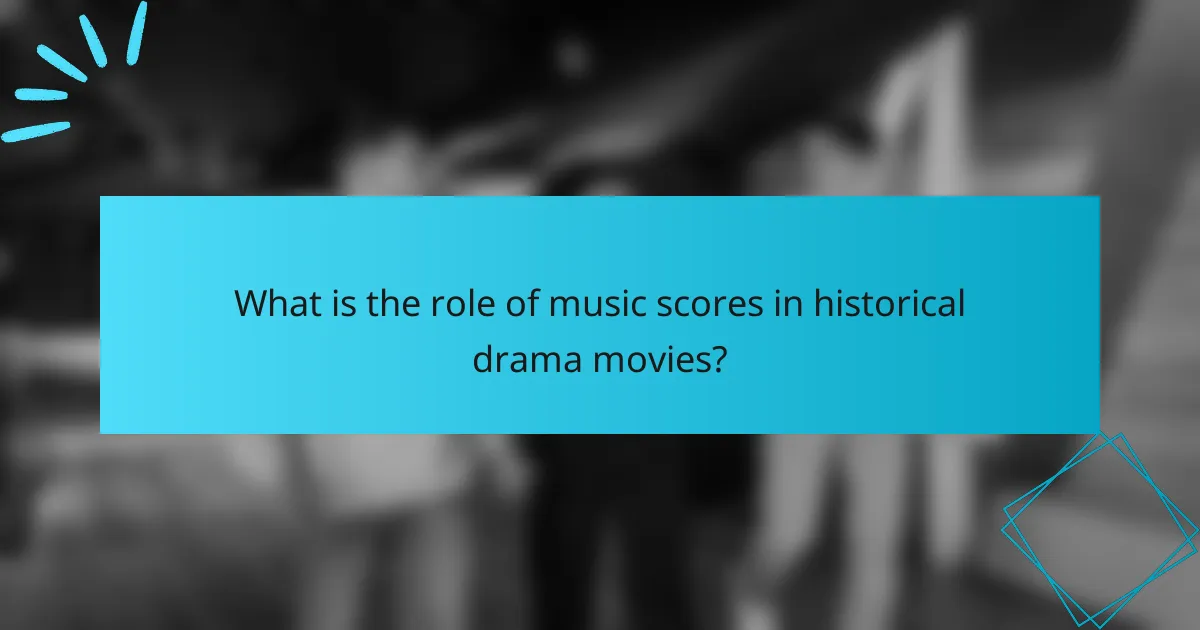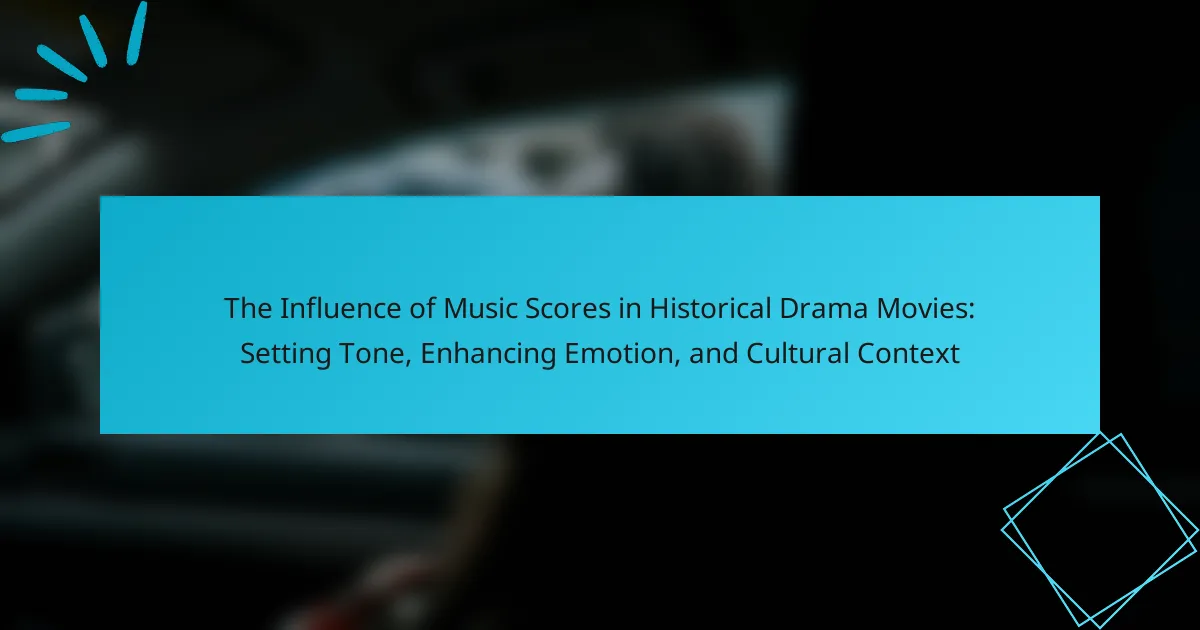
What is the role of music scores in historical drama movies?
Music scores in historical drama movies play a crucial role in shaping the audience’s experience. They set the emotional tone of scenes, guiding viewers’ feelings and reactions. For instance, a somber score can enhance moments of tragedy, while a triumphant theme can underscore victory. Additionally, music scores contribute to the cultural context of the film. They often incorporate traditional instruments or styles relevant to the historical period depicted. This connection to the time period adds authenticity to the narrative. Research shows that music can significantly influence audience perception and engagement. A study by the University of Southern California found that scores can enhance emotional responses by up to 50%. Thus, music scores are integral to the storytelling in historical dramas.
How do music scores contribute to the overall tone of a film?
Music scores significantly contribute to the overall tone of a film by enhancing emotional responses and establishing atmosphere. They create a specific mood that aligns with the visual elements on screen. For instance, a suspenseful score can heighten tension during critical scenes. Conversely, a light-hearted melody may evoke feelings of joy and relief.
In historical drama movies, music scores often reflect the cultural context and time period depicted. They can incorporate traditional instruments or styles relevant to the era, grounding the film in authenticity. Research shows that audiences are more likely to engage emotionally when music complements the narrative. This alignment can lead to a more immersive viewing experience.
Overall, music scores serve as a powerful tool in shaping the film’s tone, guiding audience reactions, and reinforcing the storytelling.
What specific elements of music help set the tone in historical dramas?
Specific elements of music that help set the tone in historical dramas include instrumentation, melody, harmony, and rhythm. Instrumentation often reflects the historical period depicted, using period-appropriate instruments like lutes or orchestras. Melody can evoke emotions tied to the narrative, enhancing the viewer’s connection to characters. Harmony contributes to the overall mood, using minor chords for tension or major chords for resolution. Rhythm establishes pacing, with slower tempos conveying solemnity and faster tempos creating excitement. These elements work together to immerse the audience in the historical context and emotional landscape of the drama.
How does the choice of instruments influence the film’s atmosphere?
The choice of instruments significantly influences a film’s atmosphere by shaping emotional responses. Different instruments evoke distinct feelings; for example, strings often create a sense of warmth and nostalgia. Brass instruments can convey power and drama, while woodwinds may introduce a feeling of whimsy or tension. The timbre and texture of the instruments contribute to the overall mood. Historical drama films often utilize period-specific instruments to enhance authenticity. This choice reinforces the cultural context and immerses the audience in the setting. Research shows that specific instrumental combinations can trigger emotional reactions, impacting viewer engagement. Therefore, the selection of instruments is crucial in establishing a film’s atmosphere.
Why are music scores important for enhancing emotional impact?
Music scores are crucial for enhancing emotional impact in media. They create an auditory backdrop that influences audience feelings. Specific melodies can evoke joy, sadness, or tension. Research shows that music activates emotional centers in the brain. For example, a study by Koelsch et al. (2016) found that music can elicit strong emotional responses, similar to those triggered by real-life experiences. Additionally, music scores help to establish context and mood in scenes. They guide audience reactions and deepen engagement with the narrative. In historical drama movies, scores can also reflect cultural nuances, enhancing authenticity.
How do composers evoke emotions through musical techniques?
Composers evoke emotions through musical techniques by utilizing elements such as melody, harmony, rhythm, and dynamics. Melody can convey specific feelings; for instance, a rising melody often suggests hope or joy. Harmony influences emotional depth; dissonant chords may create tension, while consonant chords provide resolution. Rhythm plays a crucial role; a slow tempo can evoke sadness, while a fast tempo can induce excitement. Dynamics, or variations in loudness, enhance emotional impact; sudden changes can surprise or shock the listener. Historical evidence shows that composers like John Williams and Hans Zimmer effectively use these techniques to enhance emotional storytelling in films. Their scores often align with dramatic moments, intensifying audience reactions.
What examples illustrate the emotional influence of music in historical dramas?
Music in historical dramas significantly influences emotions. For example, in “Schindler’s List,” John Williams’ score evokes deep sorrow and reflection. The haunting violin solo conveys the tragedy of the Holocaust. In “Gladiator,” Hans Zimmer’s music enhances the epic battles and personal struggles. The score amplifies feelings of heroism and loss. “The Last of the Mohicans” features a memorable theme by Trevor Jones, which captures the intensity of love and conflict. The emotional weight of the music underscores pivotal moments in the film. Each of these examples demonstrates how music shapes the audience’s emotional experience in historical narratives.
What cultural contexts do music scores reflect in historical drama movies?
Music scores in historical drama movies reflect various cultural contexts, including societal values, historical events, and regional traditions. These scores often incorporate traditional instruments and melodies that resonate with specific time periods. For instance, a score featuring string instruments may evoke the elegance of the Baroque era. Additionally, music can highlight cultural rituals, as seen in films depicting indigenous cultures. The use of regional musical styles can also signify geographical settings, enhancing the authenticity of the narrative. Furthermore, scores may reflect the emotional landscape of a particular culture, such as the use of somber tones to represent loss during wartime. Historical accuracy in music selection supports the film’s overall credibility. Therefore, music scores serve as a vital tool in conveying the cultural essence of historical dramas.
How does music serve as a cultural identifier in film?
Music serves as a cultural identifier in film by reflecting the traditions and values of specific cultures. It enhances the storytelling by using instruments and styles unique to a culture. For example, traditional African drumming can signify cultural heritage in films set in Africa. Similarly, the use of sitar music in Indian films evokes a sense of place and identity. Cultural identifiers in music can also include lyrical themes that resonate with particular societal issues. This connection helps audiences relate to characters and settings on a deeper level. Historical context further enriches the cultural significance of music in film. Research shows that films with culturally relevant music often achieve greater emotional engagement from audiences.
What role does historical accuracy play in the composition of music scores?
Historical accuracy is crucial in the composition of music scores for historical drama movies. Accurate scores enhance the authenticity of the film’s setting. They reflect the musical styles and instruments of the depicted era. This connection immerses the audience in the historical context. For instance, using period-specific instruments like the lute or harpsichord can evoke the intended time period. Additionally, historically accurate music can influence the emotional tone of scenes. It helps convey the cultural nuances of the characters’ experiences. Research indicates that audiences respond more positively to films with authentic scores. This engagement is rooted in the credibility that accurate music provides.
How do music scores impact audience perception and engagement?
Music scores significantly influence audience perception and engagement. They set the emotional tone of a scene. For example, a suspenseful score can heighten tension during critical moments. Conversely, a soft melody can evoke feelings of nostalgia or sadness. Research indicates that music can enhance memory retention of visual content. A study by Bigand and Poulin-Charronnat (2006) found that congruent music improves recall of film scenes. Additionally, music can guide audience reactions, leading them to feel empathy for characters. This engagement is crucial in historical drama films, where cultural context is conveyed through sound. Therefore, music scores are essential in shaping how audiences connect with narratives.
What are the common techniques used in scoring historical dramas?
Common techniques used in scoring historical dramas include orchestration, thematic development, and period-specific instrumentation. Orchestration involves using a full orchestra to create a rich sound palette. Thematic development focuses on creating memorable motifs that represent characters or themes. Period-specific instrumentation incorporates instruments authentic to the historical context, enhancing realism. Additionally, composers often use dynamics to evoke emotional responses. The use of silence can also heighten tension and drama. These techniques work together to immerse the audience in the historical setting and emotional landscape of the narrative.
How do motifs and themes enhance storytelling in these films?
Motifs and themes enhance storytelling in films by providing depth and coherence. They create a framework for the narrative, allowing viewers to connect emotionally. Recurring motifs reinforce key ideas and emotions throughout the film. Themes establish the underlying messages that resonate with the audience. For example, a theme of sacrifice can lead to a more profound understanding of character motivations. Motifs can manifest through visual symbols or musical cues, enriching the viewer’s experience. Studies show that films with strong motifs and themes often achieve higher audience engagement. This engagement is crucial for historical dramas, where emotional resonance is key to conveying cultural context.
What are some best practices for creating effective music scores in historical dramas?
Effective music scores in historical dramas should reflect the time period accurately. Utilizing authentic instruments from the era enhances cultural context. Researching historical music styles provides a foundation for sound design. Incorporating motifs can symbolize characters or themes throughout the narrative. Collaborating with historians ensures accuracy in musical representation. Adapting dynamics and tempo to match emotional arcs enhances viewer engagement. Testing scores with audiences can provide valuable feedback on effectiveness. These practices lead to a more immersive experience in historical storytelling.
The main entity of the article is music scores in historical drama movies. The article examines the critical role that music scores play in shaping audience experience by setting emotional tones, enhancing engagement, and reflecting cultural contexts. It discusses specific musical elements such as instrumentation, melody, harmony, and rhythm that contribute to the film’s atmosphere and emotional impact. Additionally, the article highlights the importance of historical accuracy in music composition and outlines best practices for creating effective scores in historical narratives. Through various examples, it illustrates how music influences audience perception and emotional responses in historical dramas.
